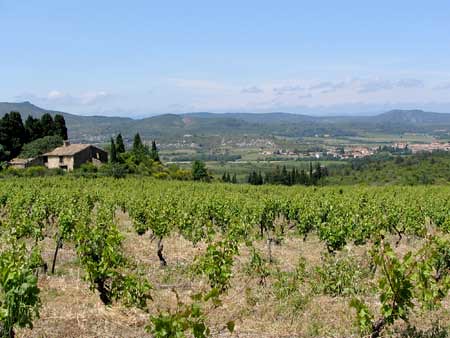
It's easy to mock the European wine glut. And Simon gets in a few shots at the Eurocrats for good measure. It's worth remembering two things, however. The first is that there are two entirely separate European wine industries. One makes origin-controlled, excellent wines (think the AOC, DOCG, DO, etc systems, or even VDQS or VdP) that are quite marketable. These are the wines you see in the United States, and there is no crisis involving them. The problem is with the enormous mass of table wine, of which there is far too much produced. This is a wine universe totally separate from what Americans think of when French or Italian wine comes to mind. The glut of table wine has nothing to do with the other wines.
Second, the wine glut is not the result of some unfortuitous happenstance. It's the predictable result of perfectly well-considered policies designed to subsidize farmers and thereby preserve the traditional character of the European countryside. These policies apply to categories other than wine with similar side effects (think of the butter mountain), and they have largely succeeded. Rural areas in France have not been transformed by massive agribusiness, and the world is better off for it. That fabric of life is something worth saving.
I always find it amusing when Americans make fun of European agricultural policy and the resulting surpluses. Like the Europeans, we spend vast sums (in our case tens of billions of dollars a year) on farm subsidies and other agricultural price supports. Here too, the result is enormous agricultural overproduction. But, unlike the Europeans, we subsidize massive agribusinesses rather than small farmers and therefore get none of the cultural and aesthetic benefits their policies obtain. Agricultural gluts are a price worth paying to preserve the hedgerows of Normandy or the charm of Languedoc. They are not a price worth paying to improve the bottom line at Archer Daniels Midland.
Thursday, May 31, 2007
EU Wine Reforms, Perspective
Posted by
Jeffrey
at
5/31/2007 01:32:00 PM
1 comments
![]()
EU Wine Reforms, Update
 The European Union is expected to scale back its proposed reforms for its ailing wine industry, reducing the number of vineyards to be ripped out and signaling a willingness to compromise on its intended ban on chaptalization.
The European Union is expected to scale back its proposed reforms for its ailing wine industry, reducing the number of vineyards to be ripped out and signaling a willingness to compromise on its intended ban on chaptalization.
The proposed ban on chaptalization has run into fierce criticism from major northern European countries, with Austria and Germany already on the record as being opposed. According to one diplomat, the proposed ban will likely be used mainly as a bargaining chip and will not be a "deal-breaker."
The practice is already banned in Mediterranean countries such as Italy, Spain, and Portugal but remains commonplace in France and other traditional wine making nations. EU agriculture commissioner Mariann Fischer Boel had hoped to supplant the traditional enrichment of wine with sucrose with the more expensive practice of adding concentrated grape must as a means of reducing the sucrose surplus. With chaptalization banned, it would be easier for Fischer Boel to push through her proposed reforms of the sugar industry, including reduced quotas and subsidies.
A European Commission spokesperson also announced that the proposed 400,000 hectacres of vines targeted for its "grubbing up" scheme will be reduced to 200,000ha. Instead, the EU plans to shift its efforts toward increased marketing.
The EU faces a real crisis in its wine industry, with a reported 1.5 billion liter "wine lake" of surplus. Once again, Brussels has proven itself to be a model of efficiency.
Posted by
Simon
at
5/31/2007 12:25:00 PM
1 comments
![]()